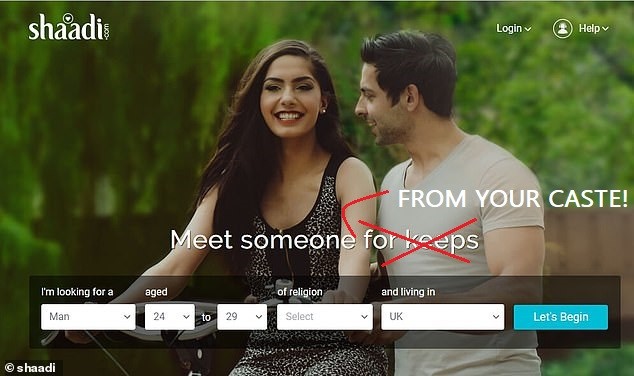
Digital Discrimination Is A Reality – Why ShaadiDotCom’s Caste-Based Matches Shouldn’t Surprise You
“…if Hindus migrate to other regions on earth, Indian caste would become a world problem…” – Babasaheb Ambedkar
On Sunday, 2nd February 2020, TheTimes reported that ShaadiDotCom, one of UK’s biggest marriage sites is reinforcing social divisions by allowing caste discrimination against so-called untouchables, officially known as “scheduled caste”.
Shaadi.com, which claims to be the “No 1 site” for Indian singles, requires users to state their caste, which it refers to as a “sub-community”. The Sunday Times found that a profile set up for a Brahmin, the elite in the caste system, was not offered scheduled caste as potential matches unless they adjusted their preferences to include all other castes.
According to the UK’s equality law 2010, such discrimination is unacceptable and is punishable. This has led to accusations that the site is allowing discrimination against scheduled caste, and raised questions about whether the site’s algorithms are consistent with equality law. Equality Act 2010 required the government to “introduce secondary legislation to make caste an aspect of the race, thereby making caste discrimination a form of race discrimination”.
While it came as a surprise to many but I believe there is nothing to be surprised of. Let me be clear at the beginning that I am not trying here to justify and defend ShaadiDotCom. It should be punished for discriminatory practices.
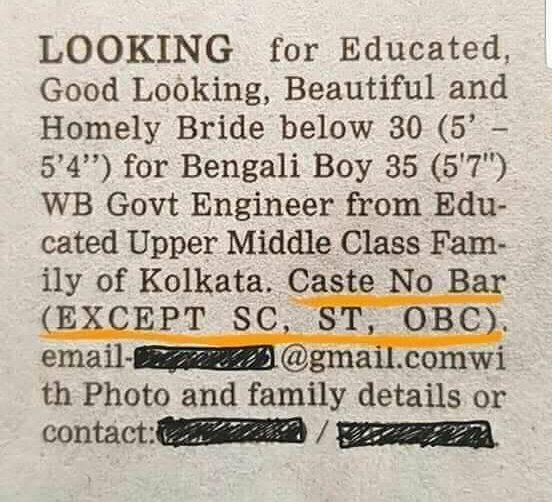
Caste is a reality and affects each and every aspect of our lives. Pick up any newspaper in India and one can find 1000s of such caste-related matrimonial pushing ads such as castes no bar but“SC/ST/OBCs need not to apply”, “SC/ST/OBCs excuse”, “Brahmins preferred”, “upper castes no bar”, or “lower castes not welcome”. The only difference is in India it is commonly accepted by everyone, which is ridiculous, and in the UK it is a crime. These casteist matrimonial websites expose another side of the story that caste is a global problem and not as various movies such as Article 15 and others try to show that caste exists in remote villages and poor and uneducated people follow caste. No, all those putting ads on these matrimonial websites are rich or middle-class people and these are the people mentioning caste no bar but SC/ST/OBCs excuse.
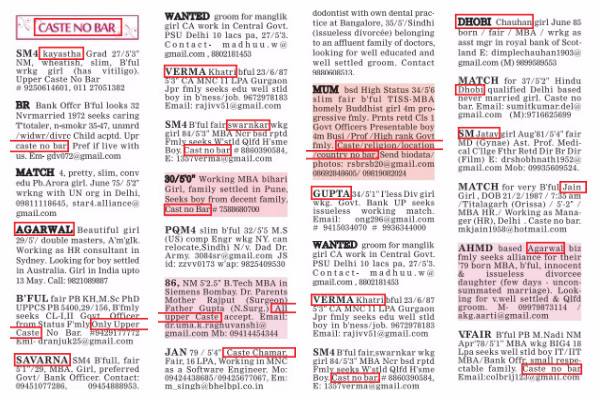
“Restricting matches by caste could be contravening the Equality Act. By forcing users to state their caste, the sites are either discriminating themselves or knowingly aiding discrimination by users,” says Chris Milsom, a barrister who led the first successful charge of caste discrimination in the UK in 2015.”
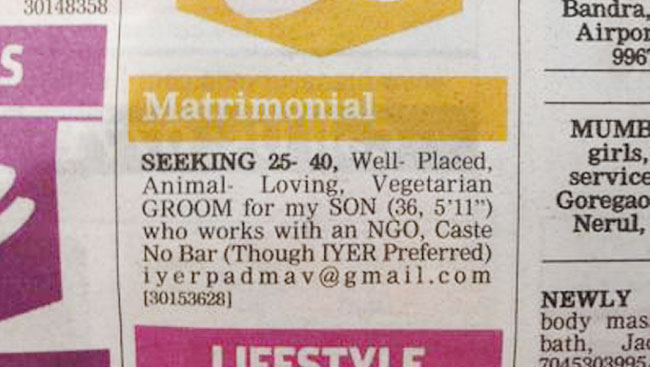

In a survey a few years ago, 92% Indians wanted to marry among their own caste. Most of the marriages among Indians in the UK also take place through such sites or arranged marriages so matches are definitely decided based on the caste. It should not surprise anyone that most of the users of such Indian matrimonial sites abroad are also India and they have inherent preferences over their castes. As Dr Ambedkar had said, caste is one thing Hindus carry with them no matter where they go. It is true in this case as well.

“There is no bias built in the system,” says a representative of ShaadiDotCom but would they allow independent experts on AI and technology investigate? If its system is not discriminating ShaadiDotCom should allow such experts to investigate and let the truth reveal.
Following I had argued a few years ago that social media and the internet is not social at all. I would state again as with the technology marginalisation of discriminated communities will rise only unless there are strict measures in place. But unfortunately, none is taking these issues seriously that abuse that follows Dalits online.
With the recent rise in technology and various companies as well as governments’ focus on artificial intelligence (AI) has led the use of AI in public policy formation and decision-making process, which in turn has given birth to a new type of democracy called Algocracy (Algorithm + Democracy, rule of algorithms). Such Algorithms learn from the given inputs and later perform tasks based on what they’re taught. But the problem arises when certain rules and regulations are already skewed, and bias and prejudices are already present in the system such as the Afro-American community in the USA is more likely to be put in the prisons, as data and various reports suggest. So, when machines learn from the flawed data, they would predict and give results which violate various human rights. With the USA judicial system implementing more and more usage of AI (risk scoring software) in the court rulings, it is a dangerous trend which should be talked about.
Same is true in India and Dalits will at a great disadvantage in future with the rise of AI or whatever. With little to no Dalits’ presence on social media and other online platforms, these AI machines are learning whatever shit these so-called upper castes talk. I am not optimistic (nothing unusual) that anything will change for Dalits but make the situation even worse. Either you feed these AI machines with your side of the story or you are screwed for sure.
What concerns more to me is the recent announcement of Chief Justice of India S A Bobde, “Possibility of developing Artificial Intelligence for courts to avoid undue delay in justice delivery.”
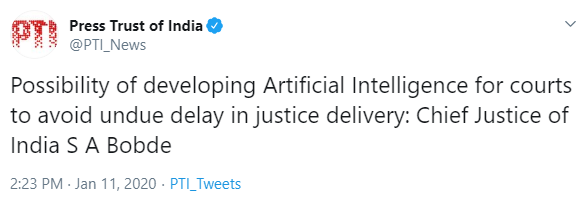
We do not need AI in courts. We all know how skewed decisions have been in past and still are against Dalit-Bahujans. And such AI machines are learning from discriminatory judgments of the courts and will give flawed results. It is happening in the USA and we must learn from the mistakes fo the others and devise better plans to handle such discrimination.
In 2006-07, NaukriDotCom was asking about the caste of the job seekers while joining the platform and around 250,000 job seekers had registered with that. We do not know how that database was used. Most likely against the marginalized communities (ok, call it a conspiracy theory if that pleases you).
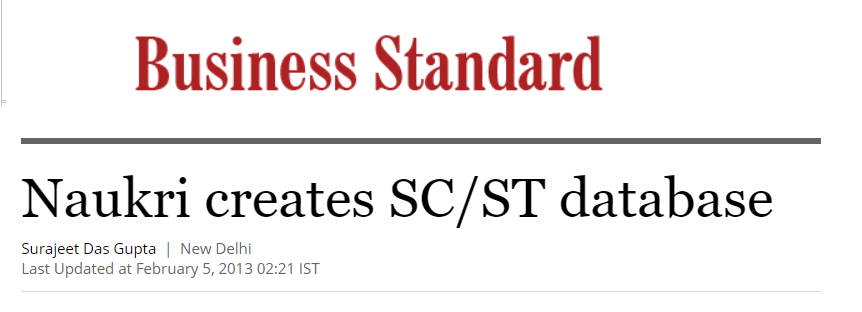
Further, there have been reports that so-called upper castes while using food delivery service platforms like Zomato or Swiggy, they ask for a person from so and so caste to deliver food. Similar is the case with car ride service in India, Ola Cabs – looking for caste or religion of the driver.
Digital discrimination is a reality and it is time for laws against that. Lastly, it should be the responsibility of social media platforms and other IT companies using AI to monitor and control their algorithms.
Author – Pardeep Attri



cast is the way of life in india